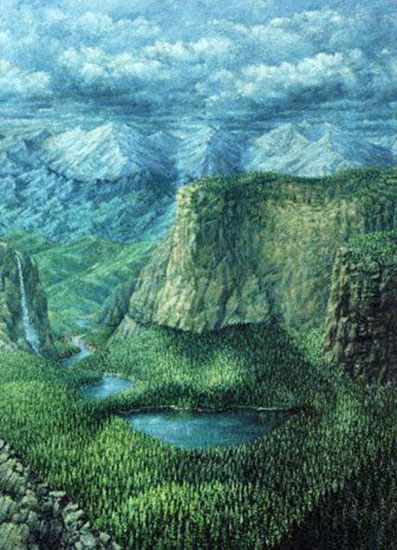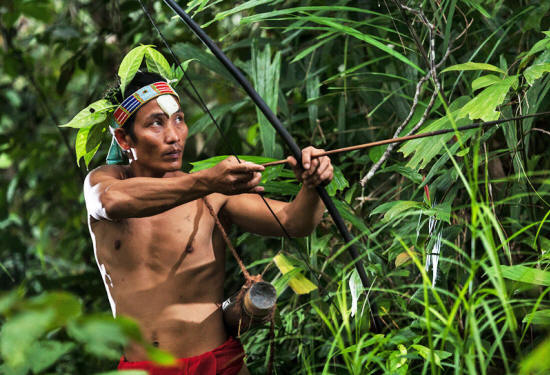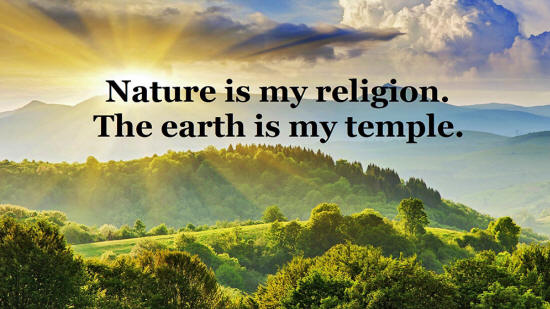|
April
30, 2017
nothing is sacred. Everything is for sale." Oren R. Lyons
Faithkeeper of
the Turtle clan
Now that the indigenous movement against the completion of the Dakota Access Pipeline brought the issue to the fore, I was reminded how urgently we need to re-connect with the sacred aspect of nature, not only because we face an ecological crisis and need to stand up in vast numbers to the ever increasing destruction of natural habitat and resources driven, but also because the separation from the nature aspect of ourselves, from our earth roots and souls, is contributing extensively to the dis-connection from our own wild nature and to our mental, emotional and physical suffering and dis-enchantment.
The Aboriginal teacher and artist Miriam Rose Ungunmerr-Baumann expresses this when she writes that it is easy for her to experience God when she hunts, is in the bush or is amongst trees, as her people have been so aware of nature that it is natural for her to feel close to the creator. [1]
And Carlos Perez Shuma, a Peruvian shaman, echoes this from the other side of the world when he says,
But not only have we been led to believe that the divine is 'out there', we have also been led to believe that we are separate from nature and, most importantly, that we are a superior species.
Societies' current spiritual beliefs, based on religions, affirm human superiority instead of equality and the sacredness of all living beings.
In Genesis God says,
In contrast, from an indigenous and shamanic viewpoint, everything in the web of life is not only alive and interrelated, but it is equally sacred as it derives from the same underlying (spiritual) field.
The loss of this knowing has led to devastating consequences.
The more we define ourselves as 'separate' from nature, the less we follow the intent of the spiritual dimension from which we have arisen, and the more we harm not only the manifested dimension of our Earth, which we can see in the ecological damage we have done, but also the spiritual and sacred dimension of the Earth and our own souls.
This doesn't mean,
however, that Earth-based cultures are sentimental about animals and
plants. Animals are killed for food and plants are eaten, but
understanding their inherent spirits leads to an honorable way of
taking their lives.
You could find animal skulls everywhere being used to house the spirits of the slaughtered animals.
Societies that are still Earth-based will also thank the animal spirits for giving their earthly body for human nourishment and often hold ceremonies in honor of them.
When I worked with shamans in South America, no food was consumed without offerings to the spirits and all leftover food was given away rather than binned.
When they cut plants for healing or collected wood for a ceremony, they always left an offering in return and thanked the trees and the plants.
In most traditions, including the North American, Inuit and Siberian, all edible parts of the animal are eaten, spirit guides are asked to lead the hunters to the animal spirit to thank it, and feathers, skins and furs are worn in ceremony.
The contrast to our cruel
factory farming and slaughtering of about 56 billion animals per
year worldwide couldn't be stronger.
Eli Gatoga, a Cherokee chief, expressed this when he said,
Slava Cheltuev, a shaman from the Dyayat Kypchak clan of Russia's Altai mountains, says:
Whilst Oren R. Lyons, university professor, author of many books and Faithkeeper of the Turtle Clan, pulls it together stringently:
It is the sacred in nature that we need to re-experience because the moment we understand the sacredness, we also realize that the right way to live is in balance and harmony with the natural laws that are inherent in the underlying field of the divine mother.
This means respecting the
preciousness of all life, giving something back whenever we take
something, honoring the spirits within nature, contributing
positively to the underlying energetic spiritual field and striving
to live in a way that sustains all creation and helps it to thrive.
Our earth souls are
starving
Within this cosmology of
the sacred inter-connectedness of all life, it becomes obvious that
the harm we do to nature within the web we also do to ourselves, to
our body/mind and to our souls.
My own observations as a psychologist, therapist and shamanic practitioner over many years have shown me how much disenchantment, emotional and mental imbalance and rootlessness modern people experience.
This is supported by profound research, which also shows us the healing power of nature on the psyche.
Nature symbolism is, for
instance, dominant in healing experiences and people of all
age-groups feel emotionally more stable, more peaceful, more alive,
more compassionate and re- enchanted after spending time in nature.
And George Monbiot, the Guardian columnist and author of 'Feral - Rewilding the Land, the Sea, and Human Life' remarks:
Unfortunately our longing for nature is increasingly pushed into the subconscious.
Only when we are encouraged to dig a bit deeper do we realize that our mind still associates being powerful and wild, being at home, feeling safe, peaceful and healthy, with being in nature.
In my practice I have never experienced anybody who, when asked to find their place of power, sanctuary, peace or healing visualized a crowded city, their place of work, a shopping mall, a club or any other place in our urban world.
People of all ages and
social backgrounds visualize a place in nature.
As we begin to reconnect consciously with nature, we recognize that our Earth soul is indeed wild and needs to be allowed to tune into where it lives, namely the vast and beautiful realms of nature, in order to be nourished and reflect itself back to us.
Every time we connect
with nature in a sacred way, we reinforce the sacred within us,
nurture our soul and give ourselves a chance to experience 'being
home'.
Well, mainly to stress that all of us, who seriously want to become whole and make a difference, need to make time to be in nature.
We need to focus on learning from nature, be inspired by it, revitalize and re-energize our natural powers, quest for vision, tune into the seasons and use the many ways and means open to us, from wilderness camps to vision quests, from fire ceremonies to connecting with the underlying spirit essences of trees, plants mountains, rocks, water, star and planets.
Above all we need to
remember, in our urban technological world and life styles, that
re-experiencing the divine in nature - and within ourselves - is
necessity if we want to become whole and agents of change.
|




